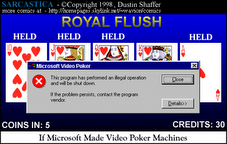
But on second read of the emails you've sent me (which I haven't shared with the public), it seems you're implying that microsoft needed the 60 days to strategize, clean up their mess (which would include their VCSY mess) and go forward without being such assholes (to be blunt) and robbing everybody's patents...?
Yo Mr. Mo;
That's why I think the coincidence that Microsoft Atlas and aQuantive Atlas being such a related structure was a preplanned strategy for outmaneuvering legal wrangling about a possible emily patent. After resolution, plan no longer needed best to bring the projected assets in house and start preparing for the new paradigm.
Now, the question lies... how long can Microsoft use up the 60 days gracefully?
I can't imagine Microsoft board allowing them to work at such a high level of risk by making deals without knowing they actually have a deal. I think the 60 day extension allows Microsoft to put in place their "plan" on how they will compete with all the other companies.
The more that comes out, the longer the delay in fielding things, the more journalists are going to be under pressure to break the story, as it were. Especially freelance journalists who have a connection and reputation to a newspaper like the wsj or the times (east or west coast) let's say. Pretty risky game they're playing. The only thing making it anywhere workable is all the competitors need to respect the game so no leaks from them.
Would Microsoft have any guarantee someone like IBM would not spook the journalistic horses? They certainly don't have any guarantee somebody 'out of bandwidth' like Mother Earth or Ladies Home Journal won't spill the whole bowl of organic black beans.
Here's a ballbuster of a blogger that argues our case for us.
http://weblog.infoworld.com/openresource/archives/2007/05/microsoft_adver.html
May 18, 2007
Microsoft + advertising may help it to drop the proprietary ball-and-chain
Filed under: Microsoft
So, Microsoft is buying aQuantive (formerly known as AvenueA/Razorfish) in a $6B takeover of the advertising agency/consultant. It's an interesting acquisition, as Larry Dignan suggests:
On the surface, the integration of the two companies should be relatively easy. AQuantive, with 2,600 employees, is based in Seattle. And the capabilities and systems aQuantive brings to the table don’t overlap with Microsoft’s current structure that much. Microsoft plans to fold aQuantive into its online services unit.
Aquantive brings three primary systems to Microsoft: Atlas provides tools for publishers and advertisers to better monetize ad inventory; Drivepm matches campaigns and inventory; and Avenue A/Razorfish, which designs ads.
But I believe the acquisition brings something completely different: a way out of Microsoft's reliance on proprietary hooks into its software. I'm no Utopian - I don't believe that Microsoft is shedding its proprietary moorings anytime soon.
But I do believe that as Microsoft begins to experiment with alternative ways to monetize a product, it will learn that indirect methods may actually provide the key to its next $44B in sales. That's great for Microsoft, as well as the rest of the industry. Again, I'm not holding my breath, but I'm optimistic.
Posted by Matt Asay on May 18, 2007 09:45 AM






No comments:
Post a Comment